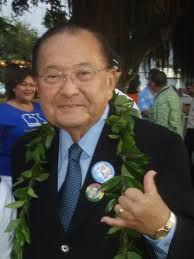(2 pm. – promoted by ek hornbeck)
 Democratic Hawaii Senator Daniel Inouye, age 88, has died from complications of a respiratory infection at Walter Reed National Military Medical Center in Washington, DC. Sen. Inouye has represented Hawaii in both the House and the Senate since it became a state in 1959. He was the first Japanese-American to serve in the U.S. House of Representatives and later the first in the U.S. Senate. He was elected to the Senate in 1963.
Democratic Hawaii Senator Daniel Inouye, age 88, has died from complications of a respiratory infection at Walter Reed National Military Medical Center in Washington, DC. Sen. Inouye has represented Hawaii in both the House and the Senate since it became a state in 1959. He was the first Japanese-American to serve in the U.S. House of Representatives and later the first in the U.S. Senate. He was elected to the Senate in 1963.
At the time of his death, Sen. Inouye was the most senior senator and the second longest serving U.S. Senator in history after Robert Byrd. As the most senior senator, he was chosen President pro tempore by the Senate, making him third in the presidential line of succession after the Vice President and the Speaker of the House of Representatives. That post now goes to Sen. Patrick Leahy (D-VT).
Sen. Inouye served in the army during WW2 from 1941 to 1947, first as a volunteer in the medical corps and later in the European theater. In 1945, during a battle in Italy with German troops, he was severely wounded but continued to lead his men in battle:
On April 21, 1945, Inouye was grievously wounded while leading an assault on a heavily-defended ridge near San Terenzo in Tuscany, Italy called Colle Musatello. The ridge served as a strongpoint along the strip of German fortifications known as the Gothic Line, which represented the last and most dogged line of German defensive works in Italy. As he led his platoon in a flanking maneuver, three German machine guns opened fire from covered positions just 40 yards away, pinning his men to the ground. Inouye stood up to attack and was shot in the stomach; ignoring his wound, he proceeded to attack and destroy the first machine gun nest with hand grenades and fire from his Thompson submachine gun. After being informed of the severity of his wound by his platoon sergeant, he refused treatment and rallied his men for an attack on the second machine gun position, which he also successfully destroyed before collapsing from blood loss.
As his squad distracted the third machine gunner, Inouye crawled toward the final bunker, eventually drawing within 10 yards. As he raised himself up and cocked his arm to throw his last grenade into the fighting position, a German inside fired a rifle grenade that struck him on the right elbow, severing most of his arm and leaving his own primed grenade reflexively “clenched in a fist that suddenly didn’t belong to me anymore”.[13] Inouye’s horrified soldiers moved to his aid, but he shouted for them to keep back out of fear his severed fist would involuntarily relax and drop the grenade. As the German inside the bunker reloaded his rifle, Inouye pried the live grenade from his useless right hand and transferred it to his left. As the German aimed his rifle to finish him off, Inouye tossed the grenade off-hand into the bunker and destroyed it. He stumbled to his feet and continued forward, silencing the last German resistance with a one-handed burst from his Thompson before being wounded in the leg and tumbling unconscious to the bottom of the ridge. When he awoke to see the concerned men of his platoon hovering over him, his only comment before being carried away was to gruffly order them to return to their positions, since, as he pointed out, “nobody called off the war!”
The remainder of Inouye’s mutilated right arm was later amputated at a field hospital without proper anesthesia, as he had been given too much morphine at an aid station and it was feared any more would lower his blood pressure enough to kill him.
Although Inouye had lost his right arm, he remained in the military until 1947 and was honorably discharged with the rank of captain. At the time of his leaving of the Army, he was a recipient of the Bronze Star Medal and the Purple Heart. Inouye was initially awarded the Distinguished Service Cross for his bravery in this action, with the award later being upgraded to the Medal of Honor by President Bill Clinton (alongside 19 other Nisei servicemen who served in the 442nd Regimental Combat Team and were believed to have been denied proper recognition of their bravery due to their race).
The senator had been hospitalized since the beginning of this month, fighting complications of a respiratory infection. Doctors were concerned about his blood oxygen levels.
His staff said that his last word was “Aloha.”
Sen. Inouye is is survived by his wife, Irene, a son, Ken, and a granddaughter named Maggie. Inouye’s first wife, Margaret, died in 2006.

1 comments
Author
Our deepest condolences to Sen. Inouye’s family and friends. His smile and his wisdom will be missed by all.
May the Goddess Guide him on his journey to the Summerlands. May his family, friends and the world find Peace.